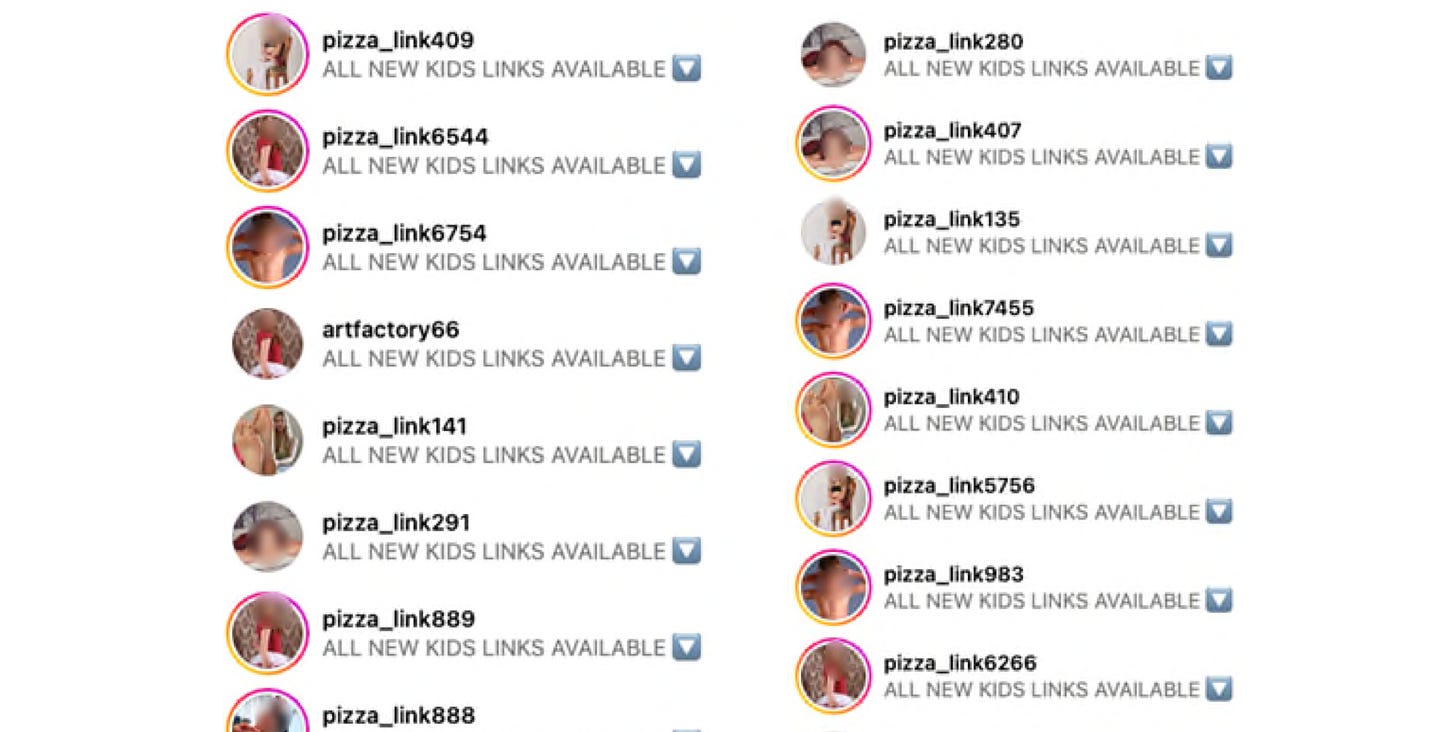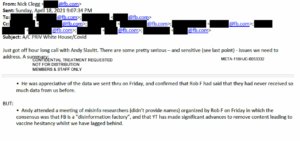
CNN ran a horrifying story last week headlined, “
New lawsuit accuses Meta of creating ‘breeding ground’ for child predators.” The lawsuit is utterly scandalous, to say the least, and you can
read it for yourself at the New Mexico Attorney General’s website. Despite experts assuring us that Pizza-gate is just a conspiracy theory, ‘pizza’ references were everywhere:

The example above was only a drop in a grotesque chum bucket of pedophilia:

In essence, the complaint alleges that Meta (Facebook and Instagram) has been
lying about policing child porn on its network:
In fact, contrary to Meta’s public representations, Meta’s platforms contain account after account with images and associated text depicting pornography, nudity, pedophilia, sexual assault, incest, and sexual fetishes. These accounts often consisted of immense social networks of individuals following and commenting on pornographic videos and images posted on the platforms. Many of the images found on Meta’s platforms were excluded from this Complaint as too graphic and disturbing.
Demonstrating not only Meta’s tolerance for the most exploitative content but also Meta’s ability to limit such material if it so chose, searches for this particular type of content yielded 30 results on OnlyFans and 646 results on Pornhub, but 19,900 results on Instagram and 15,900 on Facebook.
The reference to “cheese pizza” is a well-known pedophile code for child sexual abuse. One of the complaint’s allegations described how investigators, posing as a 13-year-old user named Taya, was repeatedly offered sexualized grooming content:
Taya also conducted a search for “chicken soup,” which is widely understood, because of its initials, to signify “child sex.” She was pointed to this account, which invites the user to “Follow if you like little things”—a reference to sexual interest in children—with cheese pizza emojis for child pornography. The account invites contact “for trade” (or trade in child sexual images) and then shows pictures of young girls in bra tops.
That’s only the beginning. The complaint goes on to describe how investigators penetrated a dystopian world of transactional child porn and even live human trafficking, all seemingly facilitated by Meta’s software, which not only permitted the posts but helped pedophiles find each other, the content, and kids. Facebook and Instagram persistently pushed ads for adult sexual content to accounts that New Mexico investigators created posing as children.
Within hours, Facebook accounts for preteen girls (allegedly 13+) created by investigators reached the maximum number of 5,000 followers — without any promotion by the child. Most followers were men between 18 and 40. I don’t need to tell you what kinds of direct messages these accounts received. But whatever you can imagine, it was worse. Here’s one pretty tame example that the investigator’s fake preteen account received:

Facebook offered to make the investigator’s fake child account a “professional account” that would allow “fans” to send the young lady gifts and money for making short videos.

Facebook also suggested other short videos in the account’s feed linking other preteen girls’ sexualized content, which I won’t show even though the complaint blurred the most offensive parts. It’s gross. Obviously, Facebook’s algorithm was intended to “teach” the preteen how to make money on Facebook.
Another investigator’s fake account (aged 14) received a direct message offering big money if she’d make an explicit sex video: $120,000 for ‘performing’ wearing a face mask, and $180,000 without a mask. Imagine what a young girl must think about that kind of money.
It was
very bad. In a sane world, just the evidence from the complaint would prompt Congressional hearings. Why TikTok gets all the blame when Facebook and Instagram are doing this kind of stuff baffles me. There is no doubt that platforms can screen this information if they want to; even PornHub does it. It is nearly beyond argument that Facebook’s tactics are intentional.
The complaint sued Meta as a public nuisance and under New Mexico’s Unfair or Deceptive Trade Practices Act, which we also recently saw used in Texas’ new lawsuit against Pfizer. Among other things, the complaint asks the court to order Meta to disgorge its profits related to these kinds of activities. That remedy alone makes all information about the issue relevant, and broadly opens discovery to the whole platform.
Meta is
not going to want to turn over that discovery.
The risk is the Attorney General will settle too fast before discovery gets underway. Because once discovery is available, criminal prosecutions can follow. Kudos to New Mexico’s attorney general.
Minn. muslims invoke religion against gay books; five pilot SADS in three weeks; five heart attacks in 16 months; GOP pulls vaccine question; Meta sued for grooming; Florida asks FDA about SV40; more.

www.coffeeandcovid.com
@Dakota 






